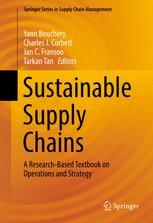

Most ebook files are in PDF format, so you can easily read them using various software such as Foxit Reader or directly on the Google Chrome browser.
Some ebook files are released by publishers in other formats such as .awz, .mobi, .epub, .fb2, etc. You may need to install specific software to read these formats on mobile/PC, such as Calibre.
Please read the tutorial at this link: https://ebookbell.com/faq
We offer FREE conversion to the popular formats you request; however, this may take some time. Therefore, right after payment, please email us, and we will try to provide the service as quickly as possible.
For some exceptional file formats or broken links (if any), please refrain from opening any disputes. Instead, email us first, and we will try to assist within a maximum of 6 hours.
EbookBell Team

4.0
66 reviewsThis book is primarily intended to serve as a research-based textbook on sustainable supply chains for graduate programs in Business, Management, Industrial Engineering, and Industrial Ecology, but it should also be of interest for researchers in the broader sustainable supply chain space, whether from the operations management and industrial engineering side or more from the industrial ecology and life-cycle assessment side.
As firms become progressively more tightly coupled in global supply chains, rather than being large vertically integrated monoliths, risks and opportunities associated with activities upstream or downstream will increasingly impinge upon their own wellbeing. For a firm to thrive, it is increasingly imperative that it be aware of economic, environmental and social dimensions of the entire supply chain it belongs to, and that it proactively monitor and manage those. Finding efficient solutions towards a more sustainable supply chain is increasingly important for managers, but clearly this raise difficult questions, often without clear answers. This book aims to provide insights into these kinds of questions for students and practitioners, based on the latest academic research.
We have noticed a recent surge in the number of courses on “sustainable supply chain management” or related topics, but a relative lack of corresponding teaching materials. While sustainability has been widely studied at the level of company strategy and extensive related pedagogical materials exist, there is still a relative lack of materials on sustainability with a supply chain management perspective.